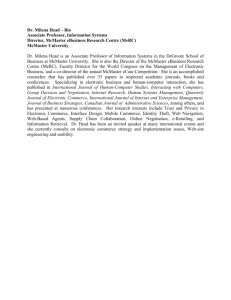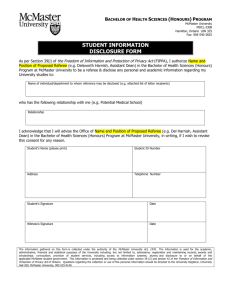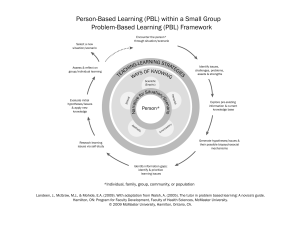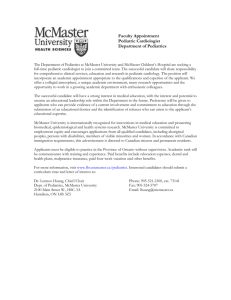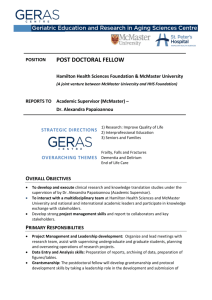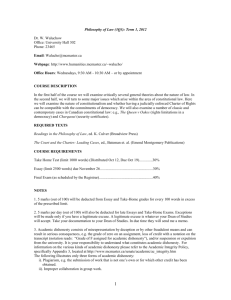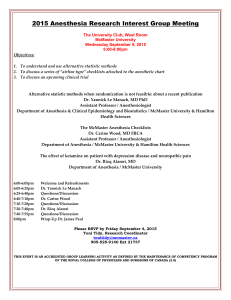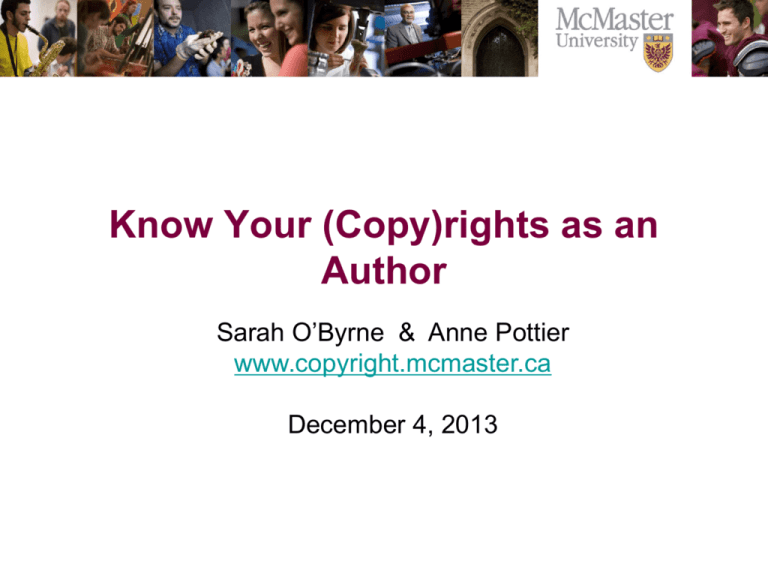
The Campaign for McMaster University
The Campaign for McMaster University
Know Your (Copy)rights as an
Author
Sarah O’Byrne & Anne Pottier
www.copyright.mcmaster.ca
December 4, 2013
Legal Disclaimer
Nothing in this presentation
constitutes legal advice.
Some of the slides used were obtained with permission from
Brock University’s presentation on Author’s Rights,
and from Olga Perkovic’s presentation
Digital Commons: an Overview
http://digitalcommons.mcmaster.ca/libraries_fp/31/
Outline
What rights do you have as an author?
What normally happens to my © when I publish?
How is Open Access different?
Open Access and Institutional Repositories
What should I look out for when publishing?
Can publishing be affected by grant agreements?
Discussion
What rights do you have as an author?
Who is an author?
I actually wrote, drew, composed or produced the work in
question VS I made substantial contributions to the
intellectual content of the paper, either in the form of:
Conception and design
Acquisition of data
Analysis & interpretation of data
Drafting of manuscript
Critical revision of manuscript
Statistical analysis
Obtaining funding
Administrative, technical or material support
Supervision
Any substantial intellectual contribution to a work’s
composition pursuant to a common design … should, in
principle count as co-authorship.
- Vaver, Copyright Law
What is Substantial?
Not defined in the Copyright Modernization Act
CCH Canadian Ltd. v. Law Society of Upper Canada
“Copyright protection will exist only where there is a
qualitatively sufficient expenditure of authorial effort.”
It will exist where there is authorial effort, and such
effort is defined in terms of an exercise either in
creativity, or in skill and judgment.
Rights as an author
Author is first owner of copyright
UNLESS….
Unless work produced in the course of
employment – then employer owns
Unless there is an agreement to the contrary
What does this mean for a McMaster researcher?
McMaster Joint Intellectual Property Policy
Article 9
9.1 Subject to section 15.4 hereof, the University shall be the
nominal owner of all newly created or discovered Intellectual
Property arising at any of the Institutions.
HOWEVER…
Article 4 – Intellectual Property
Article 4.3 Intellectual Property shall not include:
copyright in traditional academic materials such as, without
limitation, lecture notes, laboratory manuals, articles, books,
artifacts, works of visual art, maps, charts, plans, photographs,
engravings, sculptures and music, no matter in which format any of
the foregoing materials may have been recorded or embodied
including, without limitation, a computer readable format, where any
of the foregoing material has been created by someone who is an
Academic Researcher unless they have otherwise agreed to treat
any such material as Intellectual Property hereunder;
A very formal way of saying…
…you own the copyright in your research publications!
However what does copyright ownership mean?
Copyright =
The right to reproduce a work (or a substantial part of the
work)
The right to publish a work
The right to translate a work
The right to communicate a work to the public by
telecommunication
The right to authorize any of these acts.
What happens to my copyright when I publish?
Traditional copyright practices
Author transfers © to journal publisher
Author retains limited rights, e.g. right to present
paper at conference
Scope of “reserved rights” varies
Example
Journal of the American Medical Association
A slightly nicer example…
Trends in Cognitive Sciences
What do you get?
Right to use Pre-Print or Accepted Author Manuscript for:
Personal Use
Internal Institutional Use
Scholarly Posting
Right to use the Published Journal Article for:
• Personal Use
• Internal Institutional Use
Pre-print = submitted/pre-refereed version
Accepted Author Manuscript = final version (post-review)
before publisher formatting
The BEST example
Proceedings of the National Academy of Sciences
USA (PNAS)
You
Ownership of ©
Non-exclusive right to:
Use the work in compilations
or other publications
Make copies of the work for
lectures, classroom
instructions or similar uses.
Post the work (including the
PNAS-formatted PDF) on the
author’s web page provided a
link to PNAS Online is
included
Deposit the final manuscript in
repositories
PNAS
Publish
Reproduce
Distribute
Transmit
Display
Store
Create derivative works
Use the work in any form …
And permit others to do any of the
above …
Open Access
Author (generally) retains ©
Author grants publisher a non-exclusive licence to
publish, i.e.:
Publisher may publish, translate, adapt etc. but
Author may also publish, translate, adapt etc. …
Often relies on Creative Commons licences
The Creative Commons copyright licenses and tools forge a
balance inside the traditional “all rights reserved” setting that
copyright law creates.
Every license helps creators — ‘licensors’ retain copyright while
allowing others to copy, distribute, and make some uses of their
work (at least non-commercially).
Every Creative Commons license also ensures licensors get the
credit for their work they deserve.
Every Creative Commons license works around the world and
lasts as long as applicable copyright lasts
CC Licenses ‘Author’s Rights’
Attribution
Attribution-Share Alike
Attribution-No Derivatives
Attribution-Non Commercial
Attribution-Non Commercial-Share Alike
Attribution-Non Commercial-No Derivatives
Open Access: Two Venues
OA Journals (Gold OA) = conduct peer-review and
make contents freely available
OA Repositories (Green OA) = do not conduct peerreview, but make contents freely available
OA Repositories may contain
Preprints = version of an article before peer-review
Postprints = version of an article after the peer-review
process, but before copy-editing/final layout (publisher’s
PDF)
Open Access Repositories
Organized by discipline/subject or institution (aka
Institutional Repository)
e.g. Digital Commons @ McMaster
Most OA repositories comply with the Open Archives
Initiative, Protocol for Metadata Harvesting (OAI-PHM),
which permits libraries to extract metadata into catalogue
While best known for archiving theses, Institutional
Repositories might also contain articles, working papers,
reports, presentations and other materials not published
elsewhere
Benefits to OA Repositories
Materials take minutes to deposit and can be done by
individuals
OAI standards enhance searchability and visibility of
materials, which allows data to interoperate between
different computer systems
Expose content to a worldwide audience which may
transfer into higher impact or citation rates for authors
Helps university raise its research profile
Provides for long-term preservation of materials
Allow scholars to retain ownership of their works
Digital Commons @ McMaster
McMaster’s IR includes the research and scholarly
output of the university
Range of materials in the IR:
Over 17,000 works, mainly text
Theses (8,000+), both Masters and PhD’s
Journals (15) – some peer-reviewed; some hybrid
Capstones and Major Research Papers (MRPs)
Small collection of articles, books, conference presentations,
newsletters, calendars and task force reports
Content produced by Research Centres
• eg. McMaster Health Forum
Digital Commons @ McMaster
General Statistics (as of December 3, 2013)
17,521 papers to date
2,704,639 full-text downloads to date
1,141,164 downloads in the past year
Discipline Wheel – browse by subject
digitalcommons.mcmaster.ca
Additional Features
Advanced Search / Peer Review Search
“Follow” authors, publications or disciplines
Author Dashboard
Receive an email alert when your item is downloaded
View the institution, search terms used to access your item
Request usage report
For more information on our IR, please contact:
Olga Perkovic
Research & Advanced Studies Librarian
perkovi@mcmaster.ca, extension 26077
What should I look out for when publishing?
It depends…
Right to incorporate paper in other works - e.g.
thesis, conference paper, book …
Right to use in teaching
Right to share with colleagues
Distinctions between pre-print, post-print etc.
Embargo periods
Right to post in institutional repositories
What can I do if I don’t like the
publishing terms?
CLARIFY AND NEGOTIATE!
Clarify rights with publisher
If you don’t have the rights you want, ask!
Consider using author addendums:
SPARC Author Addendum
(http://www.arl.org/sparc/author/addendum.shtml)
Scholar’s Copyright Addendum Engine
(http://scholars.sciencecommons.org/)
Most effective technique – strike out
unwanted terms / write in and initial changes
Can my grant agreements affect publishing?
SSHRC, CIHR and the NSERC are developing a harmonized
policy on access to research publications. From October 15
to December 13, 2013, SSHRC and NSERC will consult with
a wide range of stakeholders in the research community on
the draft document titled the Tri-Agency Open Access Policy.
The harmonized policy is modeled after the CIHR Open
Access Policy, which remains unchanged and continues to
be mandatory.
For more information, please contact openaccess@sshrccrsh.gc.ca.
As of January 1, 2013, researchers awarded funding from CIHR are required to
adhere with the following responsibilities:
• ensure that all research papers generated from CIHR funded projects are
freely accessible through the Publisher's website or an online repository within
12 months of publication;
• deposit bioinformatics, atomic, and molecular coordinate data into the
appropriate public database (e.g. gene sequences deposited in GenBank)
immediately upon publication of research results;
• retain original data sets for a minimum of five years (or longer if other policies
apply);
• and acknowledge CIHR support by quoting the funding reference number in
journal publications.
Who to Contact
Legal
Sarah O’Byrne / Copyright Officer
sobyrne@mcmaster.ca, extension 28640
Library
Anne Pottier / Associate University Librarian
Chair, Copyright Advisory Group
pottier@mcmaster.ca, extension 22410
Digital Commons / Institutional Repository
Olga Perkovic / Research and Advanced Studies Librarian
perkovi@mcmaster.ca, extension 26007
http://www.copyright.mcmaster.ca
The Campaign for McMaster University
The Campaign for McMaster University
QUESTIONS?
McMaster University Copyright
copyright@mcmaster.ca
www.copyright.mcmaster.ca


